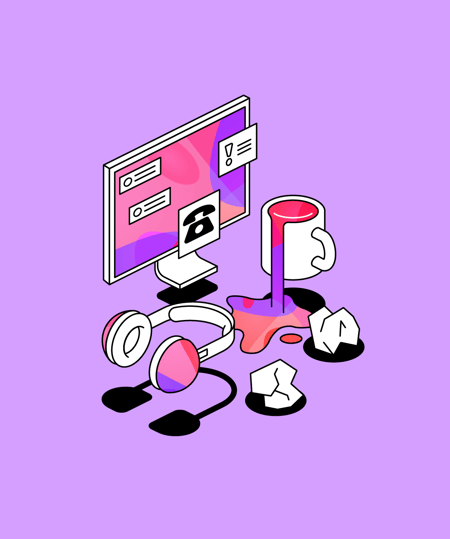5 signs of burnout at college that you shouldn’t ignore
The pressure of college life can lead to burnout, but you don't have to power through it. This article will help you identify the signs, understand what's happening, and give you practical tools and resources to recharge.
 4 min read
4 min read
 Published: 6 Aug 2025
Published: 6 Aug 2025
 Phoebe Hoar
Phoebe Hoar


Starting college is exciting but can quickly lead to burnout - a state of physical, mental, and emotional exhaustion from long-term stress. Recognize the signs (like persistent fatigue, loss of appetite, or constant frustration) and manage it by strategically scheduling time off, prioritizing work, and reaching out to university support services for help.
The college transition: excitement and exhaustion
The start of a new school year is just around the corner, bringing a whirlwind of emotions. Excitement for new friends and classes, anxiety about the unknown, and a little bit of fear are all normal feelings to have, whether you're returning to college or starting for the very first time.
Moving out of your childhood home and gaining a new sense of independence is a thrill, especially when you're studying something you're passionate about.
But with that independence comes a lot of responsibility. The reality is that many students feel a lot of pressure, worrying about how they'll handle a heavy workload, manage their finances, and build a new support network.
It's easy to get caught up in the excitement, join every society, take on extra classes, or start a new job, and suddenly, you feel completely burnt out
What is burnout?
Burnout is a state of physical, mental, and emotional exhaustion.
You’ve probably heard the term "burnout" a lot, and it's a common experience for people in higher education and beyond. It can occur when you experience long-term stress and feel under constant pressure.
It’s different to stress in that:
- Stress is often short-lived
- Stress typically doesn’t have a large impact on broader aspects of your life such as socialising.
It can leave you feeling withdrawn, disinterested and hopeless. While it was once primarily associated with the workplace, more and more students are experiencing burnout due to the growing pressures of college life.
5 signs of burnout that you shouldn’t ignore
You shouldn't ignore persistent fatigue, loss of appetite, heightened irritability, lack of creativity, and getting sick more often.
Here are 5 signs of burnout that you shouldn’t ignore
1. Feeling fatigued or disinterested in everything
Burnout can make you feel like all you want to do is sleep. Things you used to love, like watching your favorite series, going out with friends, or even listening to music, lose their appeal because the thought of engaging with them just feels like too much effort.
While it's normal to have 'those days' where you want to stay in bed, burnout is a feeling that lasts for a prolonged period.
Remember to look out for your friends, too! If you notice a friend who was once lively and always up for a night out is now constantly cancelling, be sure to check in on them.
2. Loss of appetite
When you're burnt out, cooking can feel like a monumental task because you simply don't have the energy. The pressure of choosing what to eat, when you're already experiencing burnout, can also lead to decision fatigue, making you want to avoid food altogether because it's just one more thing to think about.
Not eating well can have serious health implications, especially when you're already run down from burnout. Try to focus on having smaller, more frequent meals to make it feel less daunting.
You can also plan your meals in advance so you don't have to think about it. Need some inspiration? Check out student friendly recipes on TikTok, Instagram or blogs like Mob Kitchen for quick, cheap, and delicious ideas.
3. Becoming irritated and frustrated quickly
When you’re battling burnout you're much more likely to snap at loved ones or getting angry over small inconveniences.
This happens because you’re already feeling under pressure, it can mean that things that wouldn’t usually bother you, like someone laughing loudly, can suddenly make you feel very irritated.
4. Lack of creativity and ideas
It can be tough to come up with ideas when you’re feeling burnt out as your mind is so preoccupied in the background. This can be really difficult at college when you have assignments due or projects to work on, which can then further add to your burnout.
5. Getting sick more often
A final sign of burnout is getting sick more often than usual, or constantly feeling unwell. This is actually due to a phenomenon called somaticizing stress, where your body expresses stress physically through illness, often as an unconscious coping mechanism. If you’re feeling ill, it’s important to rest, eat nourishing food, and seek medical advice if needed.
How to manage and prevent burnout
Burnout is definitely a problem and is considered a diagnosable condition that shouldn't be ignored.
Burnout is a condition that requires attention, and it’s important not to feel that your symptoms aren’t serious enough to speak to a professional. If left ignored, burnout can worsen or lead to other mental health conditions, and have a secondary impact on your relationships, studies, and work.
How can I manage and prevent burnout when studying?
If you are experiencing burnout, here are the core actions you can take to manage and prevent it while focusing on your academic life:
- Prioritizing your workload: Plan your study sessions in order of what’s due first, using a planner or app to visualize and manage your academic commitments
- Scheduling days off: Plan weekends or a full day off in advance so you have time to recharge, ensuring you aren't thinking about assignments or revision
- Spending time away from studies: Take a few days to fully disconnect from college work and spend time with friends and family
- Reaching out for support: Talk to your university's student support services or your lecturers if you feel overwhelmed by your course demands.
What useful resources and apps are available for students experiencing burnout?
There are several useful resources for mental health support (like Student Minds and Crisis Text Line), productivity (like Notion and Forest), and meditation/wellness (like Headspace and Calm).
🧠 Mental health support
UK: The UK's student mental health charity, Student Minds, offers a wide range of resources for various challenges that come with university life. You can also contact Shout 85258 for free, confidential 24/7 text message support.
USA: The Crisis Text Line provides free, 24/7 support. Additionally, The Jed Foundation focuses on protecting emotional health and preventing suicide among teens and young adults.
On site at your university or on their homepage, you should be able to find mental health support specific to your university
⌛ Productivity apps
Apps can help you manage notes and tasks, and stay focused:
- Notion or Todoist can help you manage notes and tasks
- For staying focused, Forest plants a virtual tree that grows while you work
- Be Focused uses the Pomodoro technique to help you split up your work into manageable chunks.
🌿Meditation and wellness apps
Apps offer guided meditations for stress relief and better sleep:
- Apps like Headspace and Calm offer guided meditations for stress relief and better sleep, sometimes your college may provide free or discounted access to them too
- Insight Timer has a large library of free guided meditations, making it a great budget friendly option.
More from Supporting Students
View All
 2 min read
2 min read
How AI note taking tools can bridge learning gaps for STEM students with disabilities
Here, we explore how AI powered note taking tools act as a critical scaffold for STEM students with disabilities, helping with active conceptual engagement. This post breaks down how live transcripts and AI-generated retrieval practice. like quizzes, empower students to navigate technical subjects with full academic independence.

 3 min read
3 min read
How Genio Present can help students become more confident speakers
Students with anxiety or Specific Learning Differences can struggle to participate in oral assessments confidently and equitably. Learn how Genio Present helps students overcome public speaking anxiety, transforming nervousness into confidence and improving academic performance through innovative rehearsal techniques based on learning science.

 5 min read
5 min read
6 accessible learning apps for college students in 2026
Selecting tools that bridge accessibility and independence can be a transformative step in a student’s academic journey, fostering skills that last long after graduation. Here, we explore 2026’s top accessible learning apps, which empower students by automating unproductive barriers while preserving the deep, active engagement essential for true learning.





